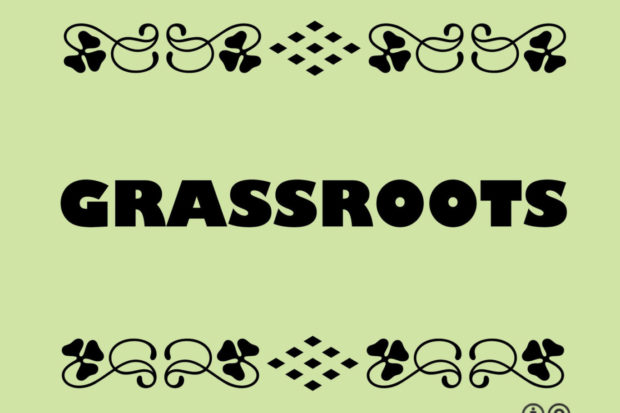
A Green Election Wrap-Up
By Richard Gomez

In California, voters were angry at Democrats and Republicans. As of this writing, votes are unconfirmed, but current results show strong support for the American Independent and Libertarian Party candidates, as well as Peace and Freedom and Green Party candidates. Incumbents still won despite the current recession and the “kick ’em out” attack ads with 55% turnout statewide and 45% in Fresno County.
Green Party candidates did well in many races, receiving far more than the number of registered Green Party members. Voters want real change and real solutions. Maybe next time, independent voters will exert all their power and vote their values as they did in Green Party victories. Important victories were achieved despite no Green Party candidates in the local Central Valley races:
- Gayle McLaughlin won reelection as Richmond’s mayor, despite a well-financed effort by Chevron Oil and other special interests.
- Bruce Delgado easily won reelection as the City of Marina’s mayor.
- Dan Hamburg won Supervisor District 5 in Mendocino County.
- Cynthia Santiago won 18% of the vote as the lone challenger in the Assembly District 51 election against incumbent Steven Bradford in a district where nearly 64% of the registered voters are Democrats.
- Independent Green Party candidate Ben Emery drew 7% of the vote in the very conservative 4th Congressional District in northern California against winning Republican incumbent Tom McClintock.
- Jack Lindblad, the only opponent to Democrat Felipe Fuentes, garnered more than 21% of the vote in
Assembly District 39 where less than 1% of voters are registered Green.
The Greens favor the ranked-choice, or instant runoff, voting method that was used for the first time in Oakland because it saves money, increases voter turnout and challenges “political party” machinery. To win, a candidate needs a majority (50% plus one vote) in the first round or such an accumulation of votes in subsequent rounds with voters ranking their top three choices. This encourages minor candidates to work better together and reduces the incidence of mudslinging campaigns.
Oakland mayoral winner Jean Quan persuaded supporters of Rebecca Kaplan to list her as their second choice, as part of an “Anybody but Don” campaign. When Kaplan finished third, she was eliminated and her redistributed votes favored Quan by 75%. There was a 42% increase in the number of ballots cast compared with four years earlier.
Runner-up Don Perata would have been the victor despite getting less than 35% votes in the type of winner-take-all election that Oakland voters abolished a few years ago. His false claims of voter confusion and other maladies created a small fuss that Perata may have hoped would create possible advantages for “big money” candidates like himself before he conceded the race. Oakland’s new voting system, which has also been used in other cities, has proven that voters can choose candidates more responsive to their local needs.
Voter anger exposed the weakness of the major parties, which survived due to money and media, yet voting reform gave Oakland a choice for a real change. Fresno’s winner-take-all system continues to leave us vulnerable to candidates beholden to special interests. Voter anger only gave us a glimpse of what real voting power can accomplish if we work together.
*****
Richard Gomez is currently a council member of the Fresno County Green Party. The Green Party meets at the State Department Building in downtown Fresno on the second Thursday of the month at 7 p.m. Contact Richard at 559-408-3320 or nate136_66@yahoo.com.
****************************************************************
The Wall Street Trickle Down to Our Local Seriously Mentally Ill
By David E. Roy

I suffered a dark epiphany recently as I again realized how the criminal greed of a few continues to play itself out locally, including in a devastating way on our area’s seriously mentally ill. These are the people who are at or near the bottom of humanity’s priorities almost always. The recent financial collapse has made this far worse for them.
Normally invisible in the local major media (but not on the streets), the plight of our intensely mentally ill rated a major headline in the Fresno Bee last month (November 13, 2010) in an in-depth feature by Barbara Anderson. Why? Because one of the mentally ill ER patients slugged a physician hard on the chest when she was trying to do a routine examine.
Anderson’s story makes it painfully clear that the county’s move to shut down its locked psychiatric facility and its emergency evaluation team has shifted the huge burden of dealing with these individuals when they are in psychiatric crisis from the county almost entirely to the ER departments of area hospitals, primarily the Community Medical Center.
According to the Bee story, something in the range of 625 such patients land in the ER each month. That’s at least 20 a day in a setting, Anderson wrote, where “workers lack the training or equipment to give them the best treatment.”
To make matters worse, these patients may have to wait for nearly 24 hours before they are seen. While I understand that a physical emergency (e.g., heart problems, drug overdose, gunshot wound) must take precedence over these patients, nonetheless for someone in a psychiatric emergency, this can be deeply confusing and extraordinarily stressful.
And, as good as the article was, it only told the story from the outside in terms of the impact on staff and institutions. There was nothing about what it was like from the inside, from the point of view of those individuals whose inner and outer worlds are so often painful, even brutal. As a nation, we have done a marginal job for decades. Now we are doing even worse.*
Social services have been operating on a life-support budget in the years since Proposition 13. Things have become far worse since the financial collapse that punctuated the end of the Bush Presidency.
Although we may never get a full and complete accounting of the dollar amount of the losses that have directly and indirectly resulted from these exercises in sleight-of-hand greed, we certainly can see what they are doing to our fragile social network, not to mention to the spirit of hope that is the carrier wave for our personal and collective well-being.
To date, I have been unsuccessful in my attempts to find a person or an organization that will provide me with a credible estimate of these losses. I have contacted both California senators, two academic economists, two research institutes and a few friends. Except for the friends and one institute, none has even responded.
However, in the last week I learned from a review in the Bee that a newly released movie, Inside Job, puts the figure at $20 trillion. I don’t know if that stands for 20 million dreams, or maybe 200 million dreams, torn apart, rearranged and sucked into a few thousand dreams dreamed by dreamers who want it all and want it now (to quote Freddie Mercury).
I imagine that I feel like many Community Alliance readers in believing that those who are responsible for the egregious financial transactions that used esoteric and unregulated “instruments” should be held accountable. They were extremely successful at redistributing our waning wealth to their already bloated accounts, and they are still doing this.
Also, I cannot understand how anyone, but particularly those elected in the name of the Democratic Party, can watch and not do anything about this. How can anyone even nominally a Democrat justify not taxing the top 5% or so at a level that would take care of any and all present deficits. None of these people would be forced to live on the streets after a stay in a local emergency room—even if they happened to be in a true psychiatric emergency.
Those individuals who presided over, designed, created and executed the tools of financial destruction; those who played dumb and ignored and denied the truth; and particularly those who benefited materially from this financial monstrosity need to be challenged to give it all back to society, to surrender these funds to care for the common good, for the least among us who need the most.
Those who broke existing laws should be aggressively prosecuted and the assets that resulted from their illegal acts seized and distributed in an equitable fashion to those who suffered losses. New laws need to be fashioned and enforced to prevent reoccurrences. The watchdog entities need to be strengthened and made flexible enough to respond quickly when new ways to scheme are put into play.
If we are to give these select individuals sufficient challenge to motivate them to act responsibly, the two greatest forces I know of are fear of deep embarrassment (intense shame) and fear of prison.
I hope we can find ways, ancient and contemporary, to bring this about, ways that are nonviolent yet demanding, that threaten exposure but not physical harm.
*While this can’t be the focus of this article, our nation’s entire approach to the seriously mentally ill—those who are schizophrenic and prone to psychosis as well as those who are bipolar, those prone to violence due to childhood or adult trauma, those flooded by the urge to kill themselves, those whose addictions have reached a life-threatening stage—needs to be thoroughly revised. We need a global and comprehensive system that is effective and humane instead of simply being geared toward a combination of warehousing and “time out” until the person is stabilized, medicated and then “released” (i.e., put back on the streets without any other resources).
*****
Ordained in the United Church of Christ, David Roy is a pastoral counselor and a California licensed Marriage and Family Therapist who directs the Center for Creative Transformation. He has a Ph.D. in theology and personality from the Claremont (California) School of Theology. Send comments to him at admin@cctnet.com or 5475 N. Fresno St., Suite 109, Fresno, CA 93711.
********************************************
Shooting Ourselves in the Foot
By Ruth Gadebusch

Society is shooting itself in the foot. Or would it be more accurate to say feet as so many of our areas seem to be in disarray, to put it mildly? We are leaving one big mess for our children, even our grandchildren, to pick up.
We deplore the many problems of society but fail to face up to doing something about it. “Eat, drink, and be merry, for tomorrow you may die” seems to be the mantra of the day. The trouble is so many among us are not merry, and we will all surely die in time, apparently with the ills of society still waiting for attention.
If nothing else, this last election most assuredly proved that, failing instant gratification, we are unwilling to give serious thought to reasonable solutions. The power play of “I got mine, too bad about you” prevails with little thought of long-term damage to society.
Worse yet, no amount of power seems enough for all too many. There is a widening gap between the rich and poor that we can’t, or won’t, bridge. This is not a healthy society.
Nowhere is the illness of society more prevalent than in our treatment of education, the nation’s future. That idea of why should I pay for education when I don’t have children in school has again surfaced leaving the need to emphasize: True, the individual benefits, but it is society that absolutely must have educated citizens. Attitudes expressed in this last election cycle and the limited voter turnout reinforce the need for education, particularly in civics.
Instead, we seem determined to reduce educational resources. Educators are expected to do it on a dime with little appreciation of the challenge of coping with a diverse society and changing technology. It is not our grandfather’s world, just as our progeny will not be living in our world.
This state, once known for its accessibility to higher education, is decimating the system. There has been a steady rise of fees under one guise or another. To make matters worse, the offerings are being reduced causing great hardship on students attempting to schedule necessary classes. Not to mention that administrators have received some rather high remuneration.
The powers that be assure us that no one is losing out because more aid is available—paid by the increased fees of other
students! Does that make sense? Our claim to fame of no student turned away can no longer be claimed, not even if we insist on calling it only a delay. Especially in this economy, the delay can be intolerable. Simply put, education is society’s responsibility. It is a matter of priorities.
It does not appear to bother us to spend more on prisons than education. Nor does it seem to bother us that many of the so-called criminals have been given long, out of proportion, sentences for minor infractions, infractions that might have been avoided had we spent more on education. After all, we know full well that prevention is far more cost-effective than remediation. It is also fair to question why our prison population is heavily minority.
Then there is the moral responsibility of housing, a simple roof over one’s head. What has been done to the American dream of homeownership is criminal—literally, though there has been little indication of prosecution of those responsible for the fiasco. Nor does hunger affect only lazy people, leaving society with no obligation to help. All too many seem to have little empathy for the less fortunate, often in dire straits through no fault of their own.
These are just a few of the things we should be more concerned about. The list is long and most assuredly should include the immigration situation. We are willing to enjoy the fruits of the labor of illegal workers but not willing to pay the price of a solution, letting hypocrisy reign. We certainly must include the unemployment predicted to last for some years to come. We have serious infrastructure needs that could employ hordes of those unemployed, but it is the death knell for any politician to even hint of a tax increase to pay for these and other needs.
In other words, we keep pushing our problem off to the next generation for we have dug such a hole as to be almost impossible to climb out of any time soon, and certainly not while we continue a war in far-off Afghanistan.
Pessimism is no fun but optimism is hard to come by under the circumstances. At the very least, we should stop shooting ourselves in the foot, if not for ourselves, for our children and their children.
*****
Ruth Gadebusch, a community activist, is a veteran, a former member of the Fresno Unified Board of Education and the California Commission on Teacher Credentialing, and an emeritus member of the Board of Directors of the Center for Civic Education.
*****************************************
Run, Progressive Democrats, Run
By Camille Russell

If you are a registered Democrat, you have an opportunity to become a decision maker in the Democratic Party. I urge you to join me in working to make the party progressive. You know what I mean—end the wars, create single-payer healthcare, fund public education, prosecute Wall Street criminals, protect Social Security, halt global warming, protect civil rights and civil liberties, etc.
Until December 9, any registered Democrat can nominate him/herself to become a voting delegate representing his/her Assembly district (AD) at the Democratic Party State Convention, which is held annually. Those elected serve a two-year term and have an opportunity to set policy, endorse candidates and improve the Democratic Party.
The California Democratic Party’s decision-making body has delegates from the county committees, elected officials and their appointees, and Assembly districts. An AD delegate has voting rights without the level of commitment required of others. Becoming an AD delegate is a good way to learn about the workings of the party, become active locally, take part in the issue-based statewide party caucuses and play a critical role in making the party more progressive. The Progressive Caucus of the CDP has challenged the party establishment more than once and it could happen again.
Six women and six men will be elected from each of the 80 state assembly districts on Saturday, January 8, and Sunday, January 9, 2011. All registered Democrats in an assembly district are eligible to vote. Details on the process are available at www.cadem.org under “ADEM Information: How to become a delegate.”
AD delegates attend the convention at their own expense and it is not cheap! The convention starts on Friday afternoon and runs through Sunday afternoon. Registration at the convention and membership in the California Democratic State Central Committee are required. Housing and transportation costs can be shared and a range of hotels/motels is available. The next convention will be April 29–May 1, 2011, in Sacramento.
Progressives who do not run have an important role to play in getting fellow progressives elected. This is real grassroots local politics; you show up and vote for your friends and neighbors who share your political views. People can participate in politics at this level without having to take out a second mortgage on the house or empty a savings account.
I was an AD-29 delegate for two years and attended conventions in San Diego and San Jose. More recently, as a member of the Fresno County Central Committee, I attended conventions in Sacramento and Los Angeles. Each year, I learned something new and met interesting people. Please give me a call if you want to make the Democratic Party more progressive, run for AD delegate or learn when and how you can support others in a run for a seat at the convention.
*****
Camille Russell is a retired teacher, immediate past president of Peace Fresno and a member of the Women’s International League for Peace and Freedom (WILPF) and the Fresno County Democratic Central Committee. Contact her at camille.russell@att.net or 559-276-2592.
